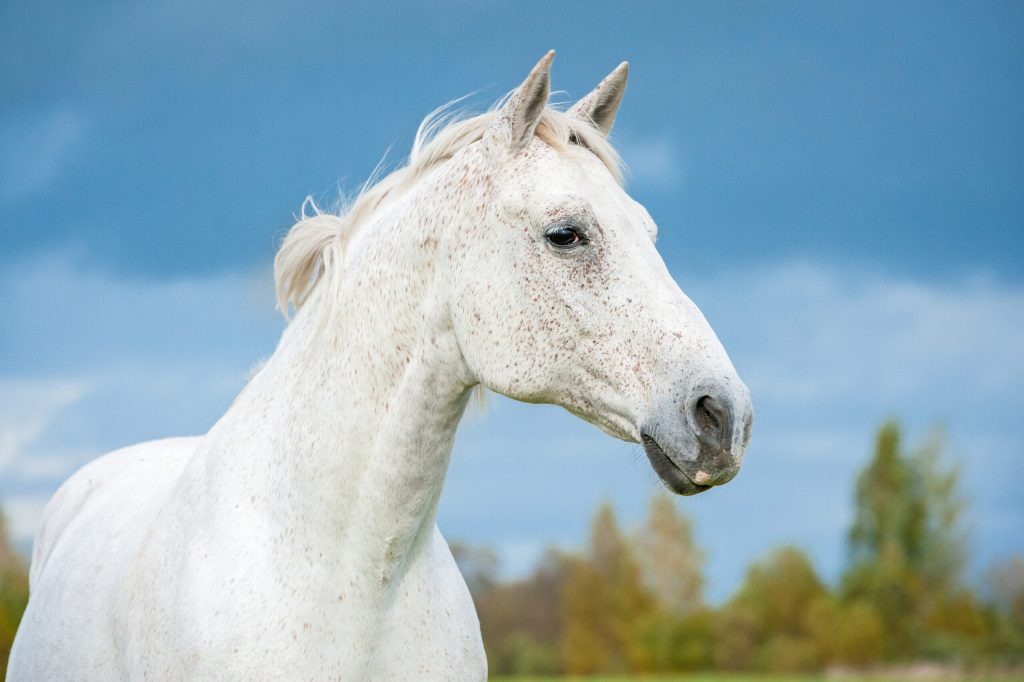Question:
I adopted a rescue horse nearly 10 years ago. She was a malnourished, unhealthy mare when I first met her. But with care and patience she has blossomed into a cherished family horse. She’s now 17 years old and very healthy. I’m worried, however, that her rough patch in life has left her vulnerable to problems as she ages. Are rescue horses who have been rehabilitated at higher risk of health complications as they age? Is there anything we should be on the lookout for? Anything we can prevent?
Answer:
It’s wonderful that you were able to successfully rehabilitate this mare and now have a great family horse. There is no scientific data on long- term complications in rescue horses. My expectation is that—with good care—you could have her for quite a few more years.

Just as for any aged horse, addressing potential medical issues in your rescue mare will likely enhance quality of life and longevity.
The key medical needs to attend to include annual wellness exams and vaccines, an annual dental examination, testing and treating for pituitary pars intermedia dysfunction (PPID, formerly known as Cushing’s), and addressing mobility problems. Your veterinarian may make additional recommendations based on his or her examination findings, but here’s a rundown of key medical needs to address:
Dental health
Dental health is critical because tooth abnormalities increase with age. Maintaining your mare’s teeth is one of the most important ways you can help her retain the ability to eat and thereby stay healthy. The American Association of Equine Practitioners (AAEP) recommends annual dental examinations and floating (removing sharp enamel points). Most horses need more frequent dental care as they grow old.
Vaccinations
Keeping up with vaccinations is increasingly important as horses age. Just as in people, a horse’s immune system wanes with the passing years. Your mare will need vaccinations, as recommended by your veterinarian within AAEP guidelines, through her golden years.
PPID
PPID (pituitary pars intermedia dysfunction) is an endocrine disease (hormone imbalance) that occurs in more than 20 percent of horses over age 15, and incidence increases with age. Geriatric horses need to be tested annually; one negative test does not mean your mare won’t develop the disease in the future. PPID causes decreased immune function, which can result in more hoof abscesses, dental problems or tooth root abscesses, and increased loads of intestinal parasites. It can also cause muscle wasting, where a horse’s topline becomes weak which can adversely affect her mobility. PPID can be controlled with pergolide (brand name Prascend), a prescription medication.
Joint support
Joint support is also a growing consideration with older horses. Arthritis, characterized by progressive deterioration of the joints, causes discomfort and decreases mobility. Ask your veterinarian about the best options for managing your horse. For many of my older patients, I like to use Adequan (polysulfated glycosaminoglycan) injections in combination with a daily anti-inflammatory medication. Oral joint supplements are another option, but some are not consistently absorbed in horses.
Digestive health
Gut health is another consideration for aging horses. The equine microbiome is a hot research area right now. In humans, a starvation period as short as 21 days can cause changes in an individual’s microbiome, and both age and obesity can alter the microbiome of horses. It’s not clear if starvation is likely to have long-term detrimental effects on a horse’s microbiome, cognitive function or body systems, though a high-quality probiotic may be an additional way you can help your mare stay healthy as long as possible.
With modern veterinary medicine able to identify and treat dental, hormonal and mobility problems, many horses can live comfortably into their 30s. I certainly hope that you have many more good years with your rescued mare.
Belgrade, Montana
management

